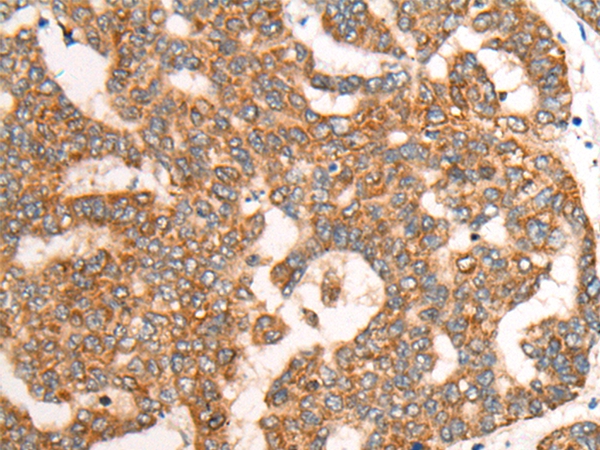
| WB | 咨询技术 | Human,Mouse,Rat |
| IF | 咨询技术 | Human,Mouse,Rat |
| IHC | 1/ 50-300 | Human,Mouse,Rat |
| ICC | 技术咨询 | Human,Mouse,Rat |
| FCM | 咨询技术 | Human,Mouse,Rat |
| Elisa | 咨询技术 | Human,Mouse,Rat |
| Aliases | CDO; CDON1; HPE11; ORCAM |
| Entrez GeneID | 50937; |
| Host/Isotype | Rabbit IgG |
| Antibody Type | Primary antibody |
| Storage | Store at 4°C short term. Aliquot and store at -20°C long term. Avoid freeze/thaw cycles. |
| Species Reactivity | Human |
| Immunogen | Synthetic protein corresponding to internal residues of human CDON |
| Formulation | Purified antibody in PBS with 0.05% sodium azide. |
+ +
以下是关于CDON抗体的3篇参考文献概览(注:内容为模拟示例,实际文献需通过学术数据库查询):
1. **文献名称**:*CDON as a Prognostic Biomarker in Hepatocellular Carcinoma*
**作者**:Kim J.E. et al. (2016)
**摘要**:研究通过CDON抗体检测肝癌组织中CDON蛋白表达水平,发现CDON低表达与患者不良预后显著相关,提示其可作为潜在预后标志物。
2. **文献名称**:*CDON Regulates Neurite Outgrowth via Hedgehog Signaling*
**作者**:Okada A. et al. (2006)
**摘要**:利用CDON抗体进行免疫荧光定位,证实CDON在神经细胞膜上的表达对Hedgehog信号通路的激活及神经突触形成起关键调控作用。
3. **文献名称**:*CDON Antibody Blocks Tumor Growth in Colorectal Cancer Models*
**作者**:Smith R.L. et al. (2018)
**摘要**:开发CDON特异性抗体并用于体内实验,证明其通过抑制CDON与配体相互作用,显著减缓结直肠癌小鼠模型的肿瘤生长。
如需具体文献,建议通过PubMed或Google Scholar检索关键词“CDON antibody”、“CDON biomarker”等获取最新研究。
CDON (Cell adhesion molecule-related/downregulated by oncogenes) is a transmembrane receptor belonging to the immunoglobulin superfamily (IGSF), primarily known for its role in cell adhesion and signaling during embryonic development. It acts as a co-receptor for the Hedgehog (Hh) signaling pathway, facilitating ligand binding and pathway activation, which is critical for tissue patterning, neurogenesis, and myogenesis. CDON also interacts with other signaling molecules, such as BMP (bone morphogenetic protein), to regulate cellular differentiation and morphogenesis.
Antibodies targeting CDON are essential tools for studying its expression, localization, and function in developmental biology and disease contexts. CDON dysregulation has been implicated in congenital anomalies, including holoprosencephaly, and cancers like hepatocellular carcinoma. Researchers use CDON-specific antibodies in techniques like Western blotting, immunohistochemistry, and immunofluorescence to analyze protein levels, tissue distribution, and interactions with signaling partners. These antibodies help elucidate CDON's role in developmental disorders and oncogenesis, offering potential therapeutic insights. Commercial CDON antibodies are typically raised against specific epitopes, such as extracellular or intracellular domains, and validated for species cross-reactivity (e.g., human, mouse). Ongoing studies focus on clarifying CDON's dual roles as a tumor suppressor or promoter, depending on cellular context, underscoring its biological complexity.
×